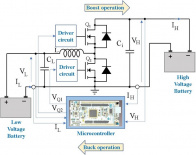SiC-Based Bidirectional Non-Isolated Converter for Battery charger System: Control and Testing
SiC-Based Bidirectional Non-Isolated Converter for Battery charger System: Control and Testing
 In the Power Electronics Innovation Center (PEIC) the power converters design and testing for battery charger system is a well-covered topic. The MOSFET in technology SiC (Silicon Carbide) is increasingly establishing itself in the field of applications where IGBTs and MOSFETs were undisputed dominators. The advantageous characteristics in terms of switching speed and thermal behaviour of SiC MOSFETs lead to the optimization of the performance of the converter. Among the converters, bi-directional topologies are of particular interest, especially in the field of battery charging for automotive systems and storage in general. The thesis is based on the testing and control of a half-Bridge board with SiC devices to evaluate the operation of a Buck and Boost type topology typical of non-isolated bidirectional battery chargers. The thesis foresees the analysis of the topology, through simulations, the development of a control (current and voltage to follow a charger profile) and the implementation of the control method by means of an actual microcontroller (Nucleo STM32) and relative operation tests.
In the Power Electronics Innovation Center (PEIC) the power converters design and testing for battery charger system is a well-covered topic. The MOSFET in technology SiC (Silicon Carbide) is increasingly establishing itself in the field of applications where IGBTs and MOSFETs were undisputed dominators. The advantageous characteristics in terms of switching speed and thermal behaviour of SiC MOSFETs lead to the optimization of the performance of the converter. Among the converters, bi-directional topologies are of particular interest, especially in the field of battery charging for automotive systems and storage in general. The thesis is based on the testing and control of a half-Bridge board with SiC devices to evaluate the operation of a Buck and Boost type topology typical of non-isolated bidirectional battery chargers. The thesis foresees the analysis of the topology, through simulations, the development of a control (current and voltage to follow a charger profile) and the implementation of the control method by means of an actual microcontroller (Nucleo STM32) and relative operation tests.
Your tasks
- Literature survey of the state-of-the-art of non-isolated bidirectional converter topologies and control strategies in battery charger system;
- Literature investigation on the SiC MOSFETs: switching transients, driver circuit and protection circuit, thermal behavior;
- Simulation of bidirectional converters and control strategies for battery chargers using a suitable simulation software (PLECS and/or SPICE / LTSPICE);
- Implementation of the simulated controls on the actual microcontroller circuit (Nucleo STM);
- Experimental testing of the converter operation and power devices behavior in the bidirectional converter topology applications.
Necessary skills
- Power Electronic basics in Inverter topologies and power devices applications;
- C programming skills (e.g. Attendance to the course Laboratory of Power Converters and Electrical Drives is sufficient);
- Background of control theory and Basic knowledge of digital control;
What you will learn
- To analyze high level technical literature (mandatory and requested by the companies producing high level technology);
- Power electronics bidirectional converter operation and power device applications;
- Power electronics simulation skills using PLECS, and LT SPICE (and/or Orcad SPICE);
- Experimental skills: how to implement a control on an actual converter, how to organize an experiment (measuring equipment, testbench…), how to report the results of the experimental activity.
Duration of the thesis: 6 months
Application
We are looking forward to receiving your application. Please include your CV and a short explanation why you fit the position (Italian or English). Send your application to salvatore.musumeci@polito.it.
